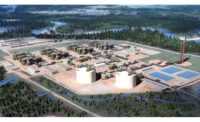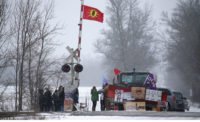New Canada Steel Protections Worry Big LNG Project Backers

The $30-billion Kitimat, B.C., project could be halted if government rules finalize, say developers.
IMAGE COURTESY LNG CANADA
Royal Dutch Shell and other energy giants behind plans for a $30-billion liquefied natural gas complex in British Columbia are warning the massive project may face an uncertain future if the Canada government proceeds to impose tough restrictions on steel imports.
The LNG Canada joint venture announced this fall it would begin construction of the giant plant, marine terminal and port in Kitimat near the Alaska border.
But in a recent filing with the Canada International Trade Tribunal, LNG Canada contends that if Ottawa finalizes a proposal to impose “safeguards” targeting various foreign steel products, it could result in a “scaling back of production targets, delays, and investor uncertainty for any additional required capital.”
LNG Canada said it may have to rethink whether to move ahead with planned future phases of the project, including two additional “trains”—gas liquefaction units that would double the plant’s capacity.
The project is considered crucial to Canada’s effort to become a major LNG exporter and is the first of what could be several similar, if smaller, projects.
In addition to steel supply worries, LNG Canada faces stiff opposition from anti-pipeline activists and environmental groups. Pipelines from oil fields in the interior to the LNG complex cut through tribal lands.
The Canadian Global Affairs Institute has joined with other industry and labor groups to form a new coalition pushing back against opposition to large LNG projects. They argue the debate has become too polarized. “We are talking 10,000 jobs,” said President Kelly Ogle. “It’s the difference between $500 million and $5 billion in LNG export.”
No Dumping
The Canada International Trade Tribunal is weighing whether to finalize provisional steel protections the federal government imposed on a temporary basis in October on seven steel products, including energy tubular products, to prevent dumping of steel on the Canadian market following the Trump Administration’s tariffs in the U.S.
The Canada provisional rules call for a 25% tariff on the products if their import numbers reach certain levels from China and other countries.
Canadian steel manufacturers have trumpeted the move.
“Announcement of a Canadian Safeguard action is … essential to stabilizing our domestic steel market” and ensuring Canadian companies can continue to compete “fairly” at home, said Joseph Galimberti, president of the Canadian Steel Producers Association, in a statement.
Still, Royal Dutch Shell and energy peers said that, if push comes to shove, they would rather see a simple 25% tariff as opposed to restrictions on their ability to import energy tubular products.
In its filing, LNG Canada contends that crucial energy tubular products that are 40 meters in length can’t be produced in Canada. The joint venture notes that even if these could be built domestically, transportation by highway or rail to Kitimat would be unfeasible.
LNG Canada says it is concerned that if steel safeguards are finalized over the next several months, the new restrictions will kick in just as the project ramps up its procurement of energy tubular products and other steel over the next five years.
While domestic steel makers may dismiss the extra costs to the project from the protectionist measures, they in fact play a critical role in LNG Canada’s viability, project officials contend.
“This argument is superficial and does not consider … all related costs that must be borne by LNG Canada, including customs duties, federal and provincial taxes, anti-dumping investigations and related proceedings [and] a rapidly changing regulatory compliance environment,” project officials said in a tribunal appeal.
A joint venture of Texas-based Fluor and Japan’s JGC Corp. is the project EPC contractor. Fluor booked its $8.4-billion share of the $14-billion contract in the fourth quarter.
The undertaking is the largest LNG project ever built in Canada and will include a liquefaction plant, a marine terminal large enough for two LNG carriers at a time, a port and a 670-km pipeline.
While it has permits needed to move forward, LNG Canada has sought to address ongoing opposition to the project, especially from First Nations activists. Police arrested 14 earlier this month in British Columbia after they blocked access to part of the pipeline that will funnel natural gas to the Kitimat plant.
LNG Canada has struck agreements with regional tribal governments, touting $702 million in project contracts with First Nations and Canadian contractors and subcontractors.
“We recognize it may not be possible to get unanimous support for a major infrastructure project in B.C., but we believe Canada’s economy cannot prosper without a growing and healthy resource sector,” said Andy Calitz, CEO of LNG Canada, in a statement.



